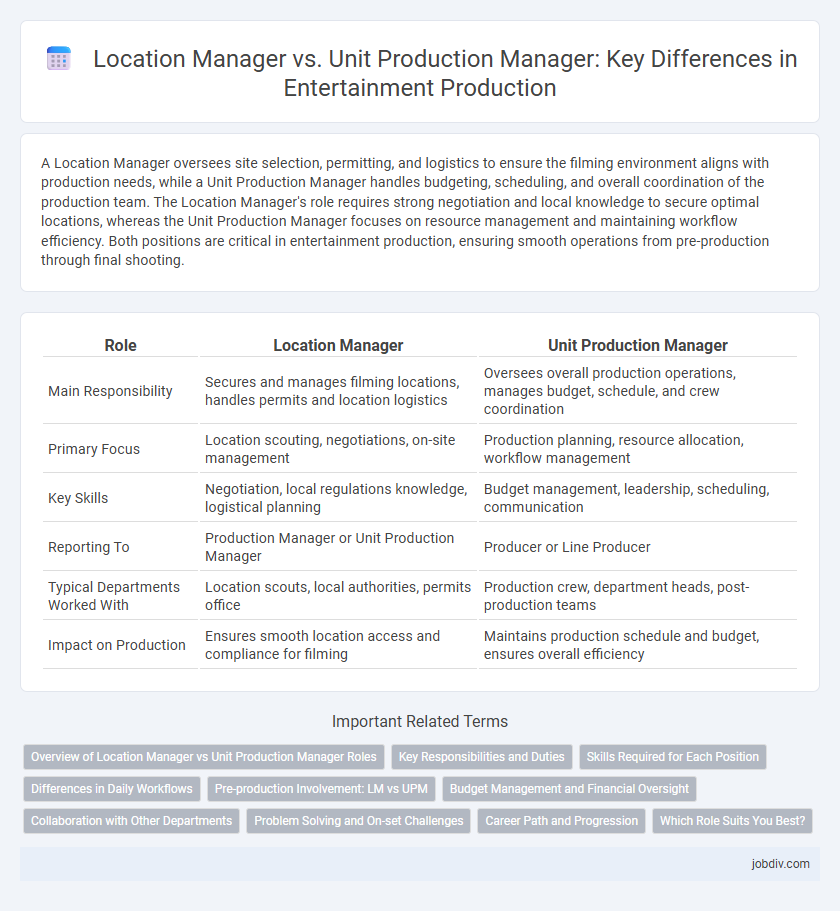A Location Manager oversees site selection, permitting, and logistics to ensure the filming environment aligns with production needs, while a Unit Production Manager handles budgeting, scheduling, and overall coordination of the production team. The Location Manager's role requires strong negotiation and local knowledge to secure optimal locations, whereas the Unit Production Manager focuses on resource management and maintaining workflow efficiency. Both positions are critical in entertainment production, ensuring smooth operations from pre-production through final shooting.
Table of Comparison
| Role | Location Manager | Unit Production Manager |
|---|---|---|
| Main Responsibility | Secures and manages filming locations, handles permits and location logistics | Oversees overall production operations, manages budget, schedule, and crew coordination |
| Primary Focus | Location scouting, negotiations, on-site management | Production planning, resource allocation, workflow management |
| Key Skills | Negotiation, local regulations knowledge, logistical planning | Budget management, leadership, scheduling, communication |
| Reporting To | Production Manager or Unit Production Manager | Producer or Line Producer |
| Typical Departments Worked With | Location scouts, local authorities, permits office | Production crew, department heads, post-production teams |
| Impact on Production | Ensures smooth location access and compliance for filming | Maintains production schedule and budget, ensures overall efficiency |
Overview of Location Manager vs Unit Production Manager Roles
Location Managers specialize in finding and securing filming locations, managing logistics and permits to ensure the site meets production needs, and coordinating on-set activities to maintain smooth operations. Unit Production Managers oversee the overall production budget, schedule, and crew coordination, ensuring resources are allocated efficiently and deadlines are met throughout the filmmaking process. Both roles are critical for production success but differ in scope, with Location Managers focusing on site-specific logistics while Unit Production Managers manage broader operational aspects.
Key Responsibilities and Duties
Location Managers coordinate site logistics, secure permits, and manage location-related budgets to ensure filming environments meet production requirements. Unit Production Managers oversee overall production schedules, coordinate between departments, and manage budgets to keep projects on time and within financial limits. Both roles demand strong organizational skills but focus on distinct aspects: Location Managers specialize in on-site operations, whereas Unit Production Managers handle broader production logistics.
Skills Required for Each Position
A Location Manager requires strong negotiation skills, attention to detail, and expertise in scouting and securing filming sites while managing permits and local regulations. A Unit Production Manager must excel in budgeting, scheduling, and coordinating logistics to ensure efficient resource allocation and adherence to production timelines. Both roles demand excellent communication and problem-solving abilities tailored to their specific operational responsibilities in film production.
Differences in Daily Workflows
Location Managers coordinate site scouting, obtain permits, and manage on-set logistics to ensure filming locations meet production needs while maintaining compliance with local regulations. Unit Production Managers oversee budgeting, scheduling, and resource allocation across the entire production, ensuring that daily operations align with the overall project timeline and financial plan. The Location Manager's daily workflow centers on external site-specific tasks, whereas the Unit Production Manager handles broader administrative and operational responsibilities within the production office.
Pre-production Involvement: LM vs UPM
Location Managers coordinate site scouting, permits, and logistical arrangements early in pre-production to secure suitable filming locations that meet creative and budgetary requirements. Unit Production Managers oversee broader pre-production planning, including budgeting, scheduling, and resource allocation, integrating location details into the production's overall framework. Both roles collaborate closely during pre-production, but Location Managers have a specialized focus on location-specific tasks, while Unit Production Managers manage comprehensive production logistics.
Budget Management and Financial Oversight
Location Managers focus on securing filming sites within budget constraints, negotiating location fees, and managing permits to ensure cost-effective production logistics. Unit Production Managers oversee the entire production budget, tracking expenses across departments, approving expenditures, and providing financial reports to maintain overall budget adherence. Effective budget management by both roles is essential to control costs and prevent financial overruns in film and television productions.
Collaboration with Other Departments
Location Managers coordinate closely with the art department and production design to secure and prepare filming sites, ensuring logistical feasibility and aesthetic alignment. Unit Production Managers collaborate with all department heads, including camera, sound, and post-production, to maintain budget adherence and scheduling efficiency across the entire production. Effective communication between Location Managers and Unit Production Managers is critical for seamless integration of location logistics into the overall production plan.
Problem Solving and On-set Challenges
Location Managers excel in problem solving by securing suitable filming sites while navigating local restrictions and logistical hurdles, ensuring smooth location transitions. Unit Production Managers tackle on-set challenges by managing schedules, budgets, and crew coordination, swiftly addressing unforeseen issues like equipment failures or weather disruptions. Both roles require adaptive decision-making and effective communication to maintain production momentum and minimize delays.
Career Path and Progression
Location Managers oversee site scouting, permits, and logistics, often beginning their careers in assistant location roles before advancing to managing large-scale productions. Unit Production Managers coordinate budgeting, scheduling, and daily operations, typically progressing from production assistant or coordinator positions to overseeing entire production units. Both roles offer distinct career trajectories within the entertainment industry, with Location Managers specializing in site management and Unit Production Managers focusing on overall production workflow and resource allocation.
Which Role Suits You Best?
Location Managers excel in scouting, securing, and managing filming sites with strong negotiation skills and local knowledge, making them ideal for professionals who enjoy logistics and place-based problem-solving. Unit Production Managers (UPMs) oversee the overall production budget, schedules, and coordination between departments, suited for detail-oriented individuals with leadership capabilities and a passion for managing complex projects. Choosing between these roles depends on whether you prefer hands-on location coordination or broader production management responsibilities within the entertainment industry.
Location Manager vs Unit Production Manager Infographic

 jobdiv.com
jobdiv.com